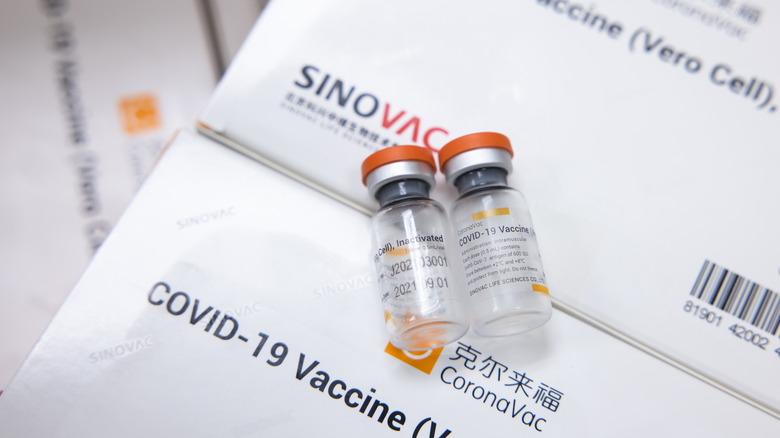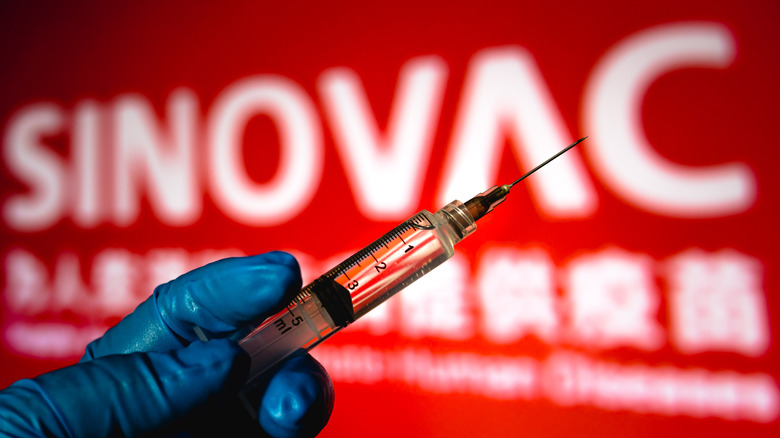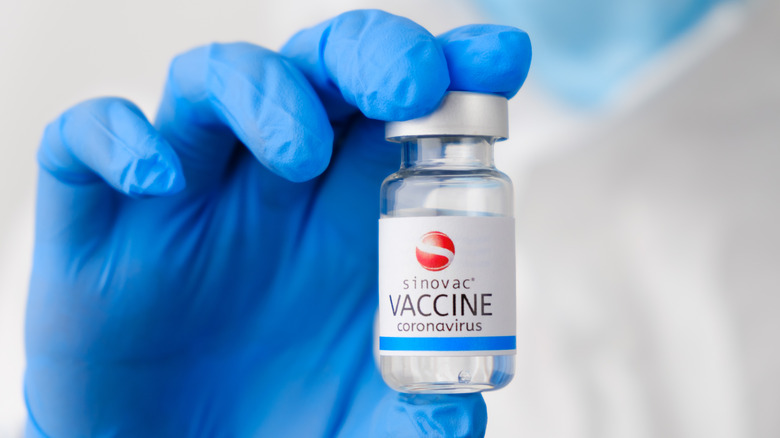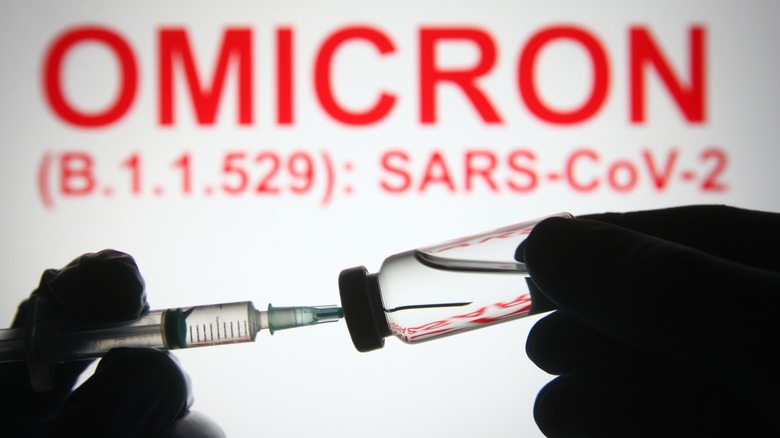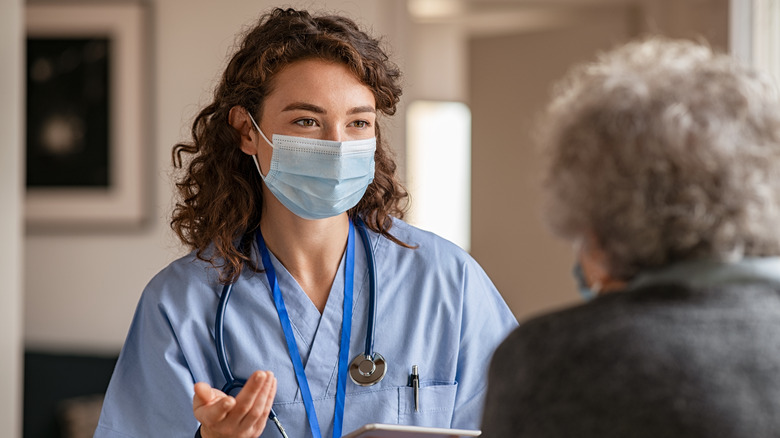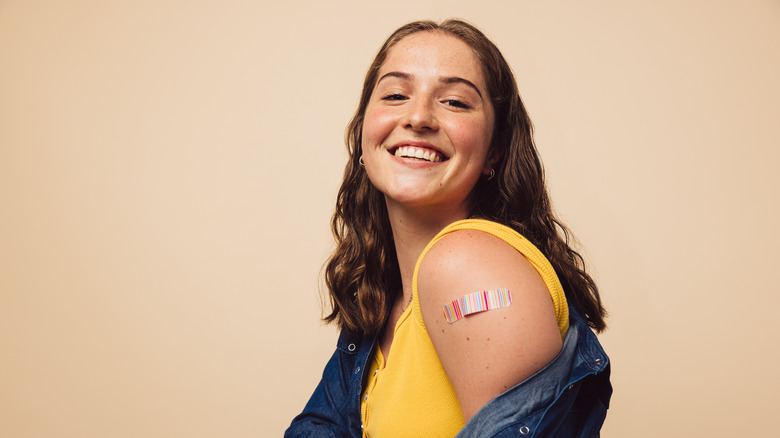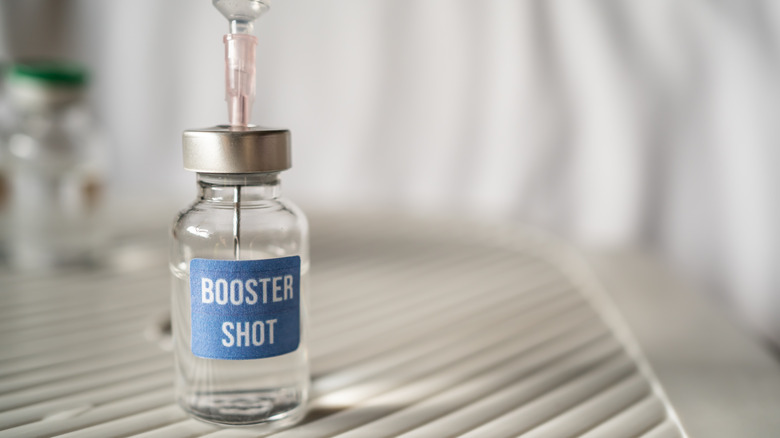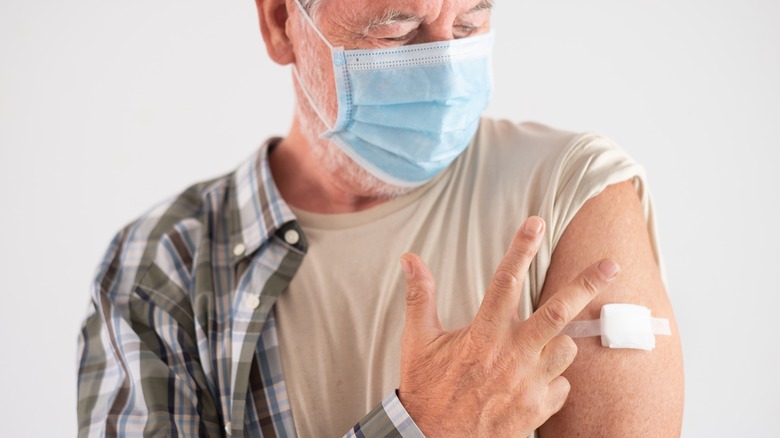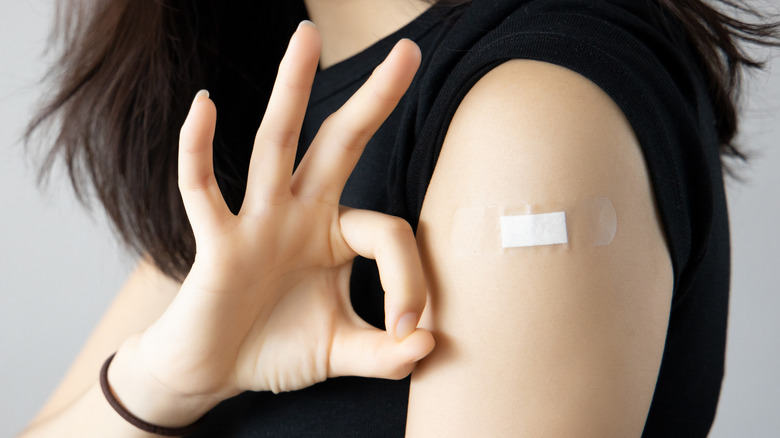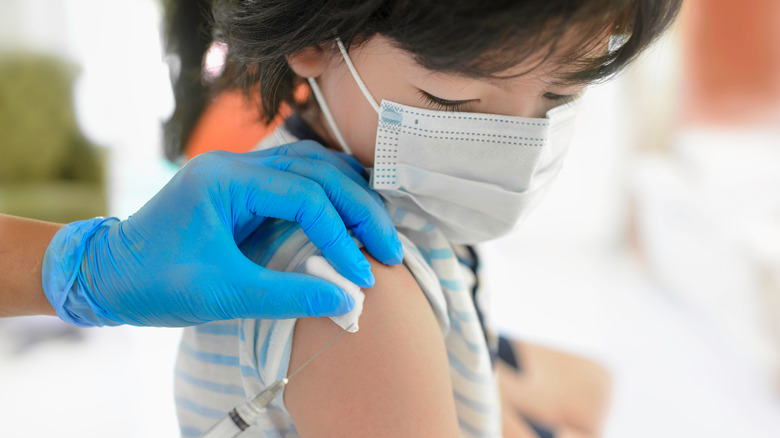Side Effects Of The Sinovac Vaccine For COVID-19 Explained
Everyone in the United States is familiar with the Moderna, Pfizer, and Johnson & Johnson COVID-19 vaccines. But you may not have heard about the Sinovac vaccine, which is widely used in China (via Medical News Today). The Sinovac vaccine, also called CoronaVac, is produced by Sinovac Biotech, a pharmaceutical company based in Beijing. This vaccine was approved for Emergency Use Listing (EUL) by the World Health Organization on June 1, 2021 (via World Health Organization).
"The world desperately needs multiple COVID-19 vaccines to address the huge access inequity across the globe," Dr. Mariângela Simão, WHO Assistant Director General for Access to Health Products, said in a statement. "We urge manufacturers to participate in the COVAX Facility, share their know-how and data, and contribute to bringing the pandemic under control." The WHO found that the Sinovac vaccine met the "international standards for safety, efficacy, and manufacturing." The EUL assesses the quality of COVID-19 vaccines by assessing product evaluation groups, performing risk-benefit assessments, and conducting on-site inspections.
WHO recommends the Sinovac vaccine for adults 18 years and older. It should be administered in a two-dose schedule with a space of two to four weeks between the first and second doses. This vaccine joins the other ones that have been approved by the WHO for emergency use, including Pfizer/BioNTech, Astrazeneca-SK Bio, Serum Institute of India, Astra Zeneca EU, Janssen, Moderna, and Sinopharm vaccines.
Side effects of the Sinovac COVID-19 vaccine
Like every vaccine, the Sinovac vaccine comes with potential side effects. According to Phase 1 and 2 clinical trial data published in February 2021, the most common side effect was injection site pain (via The Lancet). The phase 1 trial had 144 participants and the phase 2 trial had 600 participants. A total of 743 participants were given at least one dose of the Sinovac vaccine during this trial period. Other common side effects included fatigue, diarrhea, and muscle pain. However, those effects tended to be mild and lasted for no more than two days.
The Lancet also reported that "compared with other COVID-19 vaccine candidates, such as viral-vectored vaccines or DNA or RNA vaccines, the occurrence of fever after vaccination with CoronaVac was relatively low." However, this study only included "healthy adults" and did not include participants over 60 years old or who were immunocompromised. According to Healthline, there was one case in the phase 1 trial that involved a recipient getting an allergic skin reaction with welts. But this was treated immediately with antihistamines and steroids and was quickly resolved.
Sinovac vaccine third dose
In December 2021, Sinovac Biotech claimed that a third dose of its vaccine would be 94% effective against the omicron variant (via Forbes). The statement came not long after a Hong Kong University study found that the first two doses of the Sinovac vaccine did not produce enough antibodies to effectively fight against the variant (via Nikkei Asia). "We believe this signifies that the vaccine effectiveness will drop against the omicron variant," said Kelvin To, a clinical associate professor at Hong Kong University's department of microbiology and a member of the study team.
Sinovac Biotech pushed back against the doubts, saying that they performed their own study on the vaccine's effectiveness against the omicron variant. "These results suggest that a third dose of Sinovac's vaccine was effective in improving the serum neutralization against the omicron virus strain," the company said in a statement. After the omicron variant was discovered, Hong Kong researchers strongly encouraged Sinovac vaccine recipients to get a third dose as soon as possible (via Reuters). "The public is advised to get a third dose of the vaccine as soon as possible while waiting for the next generation of a more matched vaccine," researchers said in a news release.
Effectiveness against the omicron variant
Although Sinovac Biotech was optimistic about its vaccine's effectiveness against the omicron variant, the booster shot has not been shown to fight the variant (via Bloomberg). A laboratory found that three doses of the vaccine "didn't produce sufficient levels of neutralizing antibodies to protect against the omicron variant." The research suggested that people seek out a different vaccine for their booster shot if they received the Sinovac vaccine for their initial two doses.
This data is concerning because the Sinovac vaccine is one of the most widely used vaccines in the world. More than 2.3 billion doses have been shipped around the world, although most participants live in China. The omicron variant has been found to be 70 times more transmissible than the delta variant, which was the previous dominant strain around the world. Sending out booster shots from a different company will likely be a setback in the world's efforts to effectively vaccinate the world against COVID-19.
Still, Hong Kong is seeing a surge in participants getting the Sinovac vaccine (via Bloomberg). The surge comes after Hong Kong announced new restrictions for unvaccinated citizens beginning in February 2022.
What to know about the omicron variant
The omicron variant was first discovered in Botswana and South Africa in November 2021 (via New York Times). Since then, it has quickly become the most transmissible and dominant variant in the world. Omicron is "two to three times as likely to spread as Delta," but scientists are still unsure why it is so contagious. Preliminary research suggests that its ability to infect cells in the nose may play a part. This can make it easier to get by breathing in and easier to transmit by breathing out. The omicron variant is also particularly good at fighting against antibodies produced by previous infections and vaccines.
Aside from being more contagious, the omicron variant is very similar to other strains of the COVID-19 virus. "There's probably a huge amount of overlap between Omicron and the prior variants, because they are essentially doing the same thing," said Dr. Otto O. Yang, an infectious disease physician at the University of California, Los Angeles. "If there are differences, they're probably fairly subtle."
The symptoms of the omicron variant have proven to be similar to the symptoms of other variants. They include a sore throat, nasal congestion, cough, and muscle pain. However, it has been found that people are less likely to lose their sense of taste and smell when exposed to this variant.
Are vaccines effective against the omicron variant?
Although scientists are still studying the omicron variant, it is clear that this is a very contagious virus. "This is such a contagious virus that it can spread not only among the unvaccinated, where I think it still has a very substantial risk of causing serious disease that might require hospitalization, but it can also spread among vaccinated persons, although the illness it produces among the vaccinated, particularly if you've had a boost, is generally mild and even without symptoms," Dr. William Schaffner, a professor of preventive medicine and infectious diseases at Vanderbilt University Medical Center in Tennessee, told Healthline.
While yes, vaccinated individuals have a high risk of getting the omicron strain of COVID-19, it is important to stress that symptoms usually remain mild for people with two doses of the Pfizer and Moderna vaccines. "[Even if] Omicron may not lead to more severe illness than Delta, a rapid and massive surge in infections could still overwhelm hospitals with sick patients," said Dr. Robert Glatter, an emergency physician at Lenox Hill Hospital in New York City. "People who are unvaccinated remain at the highest risk, but also those who have not received a third dose of an mRNA vaccine." You will have the lowest risk of getting seriously ill from COVID-19 if you are fully vaccinated and boosted.
Do I really need a booster shot?
It is strongly recommended that all eligible recipients receive a COVID-19 booster shot. As more studies are done on the current vaccines, it is clear that the efficacy of initial doses wanes over time and your risk of getting seriously ill increases. A November 2021 study found that the efficacy of the Pfizer, Moderna, and Johnson & Johnson COVID-19 vaccines all decreased from an average of 87.9% protection to 48.1% protection over a six-month period (via Science). Fortunately, a booster shot sends those levels back to the initial protection they offered.
According to CNBC, the COVID-19 booster shot offers a low risk for most people and has a high reward in return. "There's no indication that there's something inherently risky about obtaining a booster of this vaccine," said Christopher Mores, a global health professor at the George Washington University Milken Institute School of Public Health. "There is certainly something inherently risky about becoming infected with Covid." Experts strongly encourage anyone who is eligible to get their booster shot as soon as possible.
Who is eligible for a COVID-19 booster shot?
Currently, booster shots are available for the three vaccines used in the United States (via CDC). Adults over 18 years old who have received the Pfizer-BioNTech vaccine can get either a Pfizer-BioNTech or Moderna booster shot at least five months after their second dose. Teenagers who are 16 or 17 years old can also get a booster five months after their second dose, but are only eligible to get a Pfizer-BioNTech booster shot.
Adults over 18 years old who have received the Moderna vaccine can get a Moderna or Pfizer-BioNTech booster shot at least six months after completing their second dose. Teenagers and children are not currently eligible to receive a Moderna booster. Adults over 18 years old who have received the Johnson & Johnson vaccine are eligible to get a booster shot at least two months after their first dose. Because this vaccine has a lower efficacy rate than the other two, it is usually recommended that adults get a Pfizer-BioNTech or Moderna booster shot instead of a Johnson & Johnson booster shot. If you are unsure which COVID-19 booster is best for you, speak with your doctor about your situation.
Side effects of the COVID-19 booster shot
If you are preparing to receive your COVID-19 booster shot, you may be wondering what side effects you can expect. According to CNBC, your side effects should be similar to the ones you experienced during your first two doses, although not as intense as the first time around. "People had fewer reactions after their third dose than after their second dose," CDC director Dr. Rochelle Walensky said in a White House briefing. The most common side effects of the COVID-19 booster include pain and swelling at the injection site, muscle pain, and fatigue. Other common side effects include headache, fever, chills, and nausea. Some people may also experience swollen or sore lymph nodes.
But don't worry too much about this uncommon bodily effect. According to CNN, swollen lymph nodes are a sign of an immediate bodily response to the vaccine. "It incites an immune response by the body that is necessary to fight off the Covid-19 virus, should it enter a person's body," Dr. Connie Lehman, chief of breast imaging at Massachusetts General Hospital and a professor of radiology at Harvard Medical School, told CNN. "So these enlarged lymph nodes are evidence that the vaccine is doing exactly what our bodies need it to do." Speak with your doctor if you are concerned about any side effects from the COVID-19 vaccine or booster shot.
Vaccine side effects are common
No matter which COVID-19 vaccine you end up getting, you can expect to experience a few side effects. But this is nothing new. Mild to moderate symptoms from all vaccines are common. According to the CDC, vaccines work by forcing your body to create an immune response that will protect you from the real disease in the future should it ever enter your body. Side effects like fatigue, headache, and chills are all signs that your body is effectively getting ready to fight the disease you are getting vaccinated against. All vaccines go through rigorous testing before they are approved for use by the public. Even vaccines that have been approved for emergency use, like the COVID-19 vaccines, are required to meet strict standards of safety and efficacy.
Some people are concerned about the long-term side effects of COVID-19 vaccines. While it is understandable to be wary, experts say that long-term effects are rare. According to Women's Health, most vaccine side effects occur within a few days or weeks. "Thinking of all the vaccines we use in childhood and adulthood, I can't think of any long-term side effects," said Dr. William Schaffner, an infectious disease specialist and professor at the Vanderbilt University School of Medicine. "Vaccines don't have a bad effect that occurs eight months, a year or two, or longer." If you are concerned about getting your COVID-19 vaccine or booster, speak with a trusted healthcare professional.

